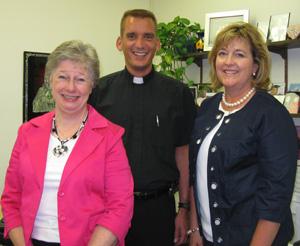
By Barb Arland-Fye
FORT MADISON — Not every wedding produces a marriage. The Catholic Church recognizes that fact, and its marriage tribunals assist divorced individuals seeking to have their former marriages declared invalid.
But the process is confusing and mysterious to many Catholics. Responding to questions from parishioners in their own parishes, faith formation leaders in the Keokuk Deanery hosted an annulment workshop Oct. 13 at Ss. Mary & Joseph Church in Fort Madison. Their guest speakers were two individuals who deal with the annulment process on a regular basis: Father Joe Wolf, half-time judicial vicar for the Davenport Diocese who leads the Marriage Tribunal, and Terri Doran, the Tribunal’s auditor.
Before addressing questions about the grounds for annulment, Fr. Wolf, who also is pastor of Our Lady of the River Parish in LeClaire, explained Church teaching on the sacrament of marriage, which has its foundation in Scripture. Marriage reflects the love of God and the covenant individuals have with God. The Church further teaches that a man and woman who enter into sacramental marriage are wedded for life and that remarriage of individuals who have been divorced from a living, lawful spouse is contrary to God’s plan as taught by Christ.
“We want to uphold the principles and teaching of Jesus in the Gospel,” Fr. Wolf said, but the Church also recognizes that “not every wedding produces a marriage.”
When a marriage breaks down and spouses divorce, the legal aspect of the marriage has ended but the sacrament has not. If the Church determines that an impediment existed, which prevented a valid marriage, an annulment may be granted, the two speakers said. “An annulment is not a Catholic divorce,” Doran noted.
Because marriage is based on consent, the task of the tribunal is to investigate, at the request of a petitioner, whether consent was freely and legitimately given at the time of marriage. The tribunal looks at the facts: what happened the day of the wedding when the spouses gave their consent to a lifelong marriage? What was going on in each individual’s life? What was going on behind the scenes? The petitioner provides the Tribunal with a list of several witnesses who can answer questions about the personal history of one or both of the ex-spouses and substantiate the petitioner’s testimony. The respondent is invited to do the same.
Many people believe that children born of a marriage that has been annulled are illegitimate. That is false, the speakers said. Confusion also exists about Catholics who married outside the Catholic Church and later divorced, divorced Protestants who choose to enter the Catholic Church and then remarry, and divorced Catholics who were married to un-baptized spouses. The Catholic Church recognizes Protestant marriages as being valid; so divorced Protestants who choose to become Catholic and remarry in the Catholic Church must seek an annulment first, the speakers said. They also noted that divorced spouses may continue to receive Communion, unless they have remarried without obtaining an annulment.
The Davenport Diocese handles about 200 annulments each year, Doran said. Of the formal cases, approximately one-third involve two Catholics, one-third involve a Catholic and a non-Catholic, and one-third involve non-Catholics wanting to enter the Church and/or to marry a Catholic.
Completion of the annulment process varies depending on the nature of the case, the speakers said in response to a question about why it “takes so long.” Generally, the process takes 12 to 14 months to complete in the Davenport Diocese, which has a small staff.
Following the presentation, participants were able to meet with the speakers to ask questions privately. “We all get asked questions about divorce and annulment,” said Mary Edwards, one of several faith formation leaders in the Keokuk Deanery who attended the workshop. But they don’t feel equipped to answer all of the questions. “That’s why we felt this workshop was needed,” added Edwards, who is religious education director for the Burlington area Catholic community. “I think everyone who attended came away with new information. I know I did.”
Diocese of Davenport Tribunal information
The work of the Tribunal is largely subsidized by the Annual Diocesan Appeal; however, various fees are assessed according to the specific type of case whereby petitioners are asked to help offset the costs involved during the proceedings. The current fee for a formal marriage case is $400 unless the petitioner has a financial hardship. No one is turned away due to an inability to pay.
Tribunal staffing: Two full-time staff, a secretary and an auditor; a half-time judicial vicar and judge; several non-salaried part-time judges; and two, non-salaried defenders of the bond who review all cases.
For more information: Contact your pastor, deacon or the Tribunal at (563) 324-1911.








